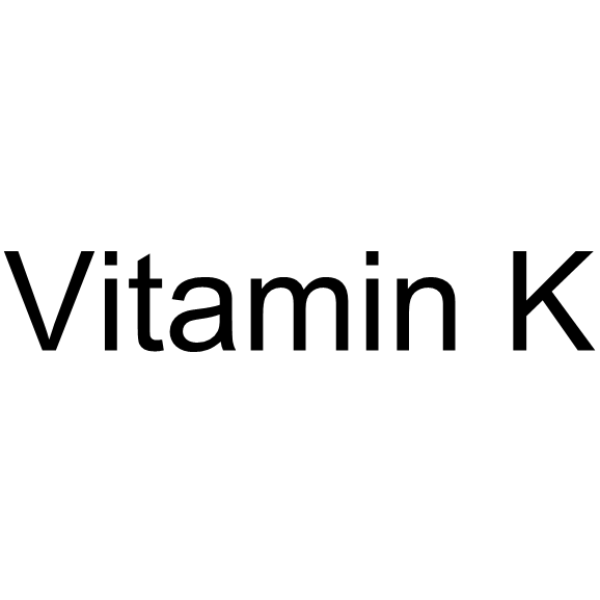产品
编 号:F067908
产品类型
规格
价格
是否有货
5mg
询价
询价
10mg
询价
询价
50mg
询价
询价
结构图

CAS No: 12001-79-5
产品详情
生物活性:
Vitamin K, the blood-clotting vitamin, is important for the function of numerous proteins within the body, such as the coagulation factors, osteocalcin and matrix-Gla protein.
体内研究:
Vitamin K is well-known for its function in blood coagulation. Several human studies report the beneficial role of vitamin K supplementation in improving insulin sensitivity and glucose tolerance, preventing insulin resistance, and reducing the risk of type 2 diabetes. The adequate intake for vitamin K has been proposed to be 90 μg/day for women and 120 μg/day for men. Vitamin K deficiency results in an increase in undercarboxylated osteocalcin, a protein with low biological activity. Several studies have demonstrated that low dietary vitamin K intake is associated with low bone mineral density or increased fractures. Additionally, vitamin K supplementation has been shown to reduce undercarboxylated osteocalcin and improve the bone turnover profile.
体外研究:
Phylloquinone (vitamin K1) and Menaquinones (vitamin K2) are the two naturally occurring forms of vitamin K. Phylloquionone is the major dietary source of vitamin K and is found at highest concentrations in green leafy vegetables. Vitamin K2 (menaquinone) is found in small amounts in chicken, butter, egg yolks, cheese and fermented soyabeans. Vitamin K1 and vitamin K2 are required for the γ-glutamyl carboxylation of all vitamin K-dependent proteins. Vitamin K has important actions in the nervous system. Vitamin K contributes to the biological activation of proteins Gas6 and protein S, ligands for the receptor tyrosine kinases of the TAM family (Tyro3, Axl, and Mer). In brain, vitamin K also participates in the synthesis of sphingolipids, an important class of lipids present in high concentrations in brain cell membranes.
Vitamin K, the blood-clotting vitamin, is important for the function of numerous proteins within the body, such as the coagulation factors, osteocalcin and matrix-Gla protein.
体内研究:
Vitamin K is well-known for its function in blood coagulation. Several human studies report the beneficial role of vitamin K supplementation in improving insulin sensitivity and glucose tolerance, preventing insulin resistance, and reducing the risk of type 2 diabetes. The adequate intake for vitamin K has been proposed to be 90 μg/day for women and 120 μg/day for men. Vitamin K deficiency results in an increase in undercarboxylated osteocalcin, a protein with low biological activity. Several studies have demonstrated that low dietary vitamin K intake is associated with low bone mineral density or increased fractures. Additionally, vitamin K supplementation has been shown to reduce undercarboxylated osteocalcin and improve the bone turnover profile.
体外研究:
Phylloquinone (vitamin K1) and Menaquinones (vitamin K2) are the two naturally occurring forms of vitamin K. Phylloquionone is the major dietary source of vitamin K and is found at highest concentrations in green leafy vegetables. Vitamin K2 (menaquinone) is found in small amounts in chicken, butter, egg yolks, cheese and fermented soyabeans. Vitamin K1 and vitamin K2 are required for the γ-glutamyl carboxylation of all vitamin K-dependent proteins. Vitamin K has important actions in the nervous system. Vitamin K contributes to the biological activation of proteins Gas6 and protein S, ligands for the receptor tyrosine kinases of the TAM family (Tyro3, Axl, and Mer). In brain, vitamin K also participates in the synthesis of sphingolipids, an important class of lipids present in high concentrations in brain cell membranes.
产品资料

